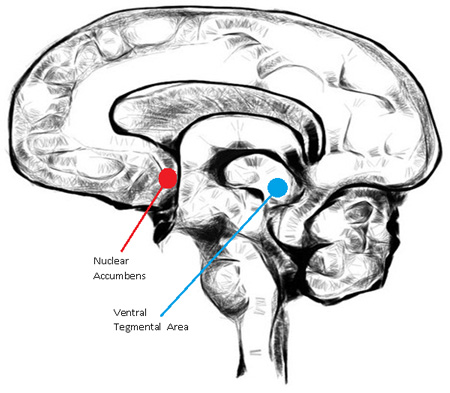How music affects productivity

Like many people, music takes up most of my life. My preferences are constantly changing, depending on what I feel and what I do. In my playlist at work, there are indie-pop, and jazz, and electronics, and a lot of other music that sets me up for work.
Looking at my playlist, I imagine how music affects my work. It is curious to understand this influence from a scientific point of view.
')
When we listen to music, a part of the brain called the nucleus accumbens (pleasure center) is activated, which produces dopamine - a hormone that affects mood. It is located in the ventral tegmental area (VTA). All of this is part of the brain's “reward system”.
Dopamine is produced in different situations, for example, when you eat a favorite dish or get a new subscriber on Twitter. Therefore, dopamine is responsible for the following statements:
“Two cheeseburgers are equal to one orgasm.” - PBS
In addition, the amount of dopamine produced and feelings experienced depends on the effect of surprise. For example, a new song that you like will take more pleasure than a beloved, but old song.
Music helps to feel alive
From the point of view of evolution, the nature of pleasure when listening to music is quite complex. The neurologist and musician, Jamshed Bharucha, noted that creative activities, in particular music, help a person to “synchronize” in society, including improving teamwork. And it was important for the survival of man as a species.
A study was conducted on this topic: two groups of children, 24 children each, were shown toy frogs and told that they can be woken up by singing a song or showing some kind of exercise. The children from the first group sang a song to the frogs, and from the second they walked and crawled around the toys.

Then the children were given tubes with glass beads, which soon scattered across the floor. As a result, the children who sang the song helped each other in collecting balls much more. A simple experiment showed that music develops a sense of community, which was especially important at the dawn of humanity.
Does music help make work better?
Music is very helpful if you need to do boring and uninteresting things. In addition, your favorite music makes work more enjoyable, which means you can concentrate better and complete things faster. The study of the journal Neuroscience of Behavior and Physiology proved that a person's ability to recognize images, letters and numbers improves when listening to classical or rock music.
Similarly, music influenced the conveyor workers — they felt better and made fewer mistakes.
As can be seen from research, music has a beneficial effect on the performance of boring and repetitive tasks. However, when learning something new, for example, at the first lessons in a driving school or when writing the first lines of a program code, it is better to turn off the music.
In 2010, the University of Wales Institute proved this in the course of a study, when a group of people were given the rather difficult task of memorizing and reproducing sounds in a certain order. The subjects coped better with the task in silence.
Music has a positive effect on work if you are an expert in your business, even if it is as difficult as a surgical operation. If you do something familiar, even if difficult, the music will improve performance and reduce the likelihood of error.
In the study of the American Medical Association (American Medical Association), scientists have proven that surgeons work better if calm music is playing in the background. Moreover, even unloved music improved the work of doctors!
Creating a working atmosphere
Different people have different musical preferences. For example, writer Stephen King points out that he likes to work while listening to hard rock, although he will make it difficult for many to concentrate on the current case. Everyone should himself, empirically, determine what kind of music suits him.
One of the simple rules is to create a playlist of already known and favorite songs, because when listening to unfamiliar songs, the brain can be distracted by memorizing and recognizing new sounds. As a result, you will pay more attention to music, not to work. At the same time, the level of dopamine may increase, and it will work out completely.
It has also been proven that music without words has the greatest positive impact on performance. Therefore, many people like to listen to classical music.
Source: https://habr.com/ru/post/154795/
All Articles